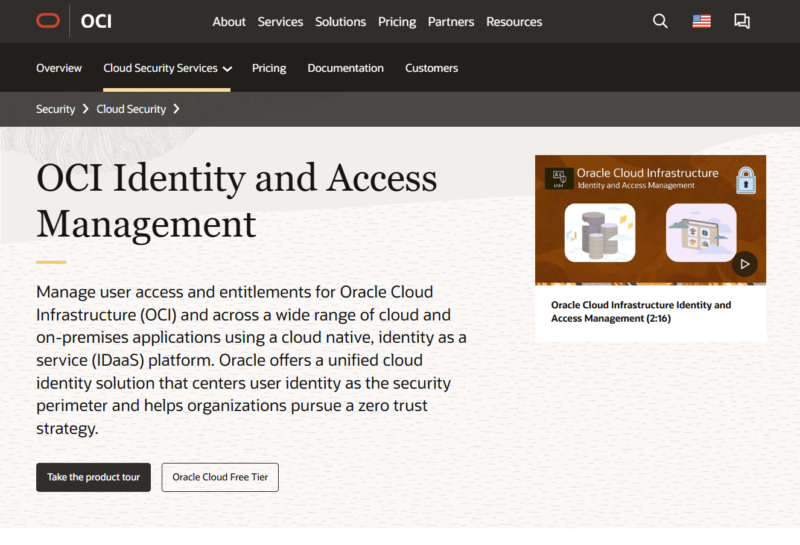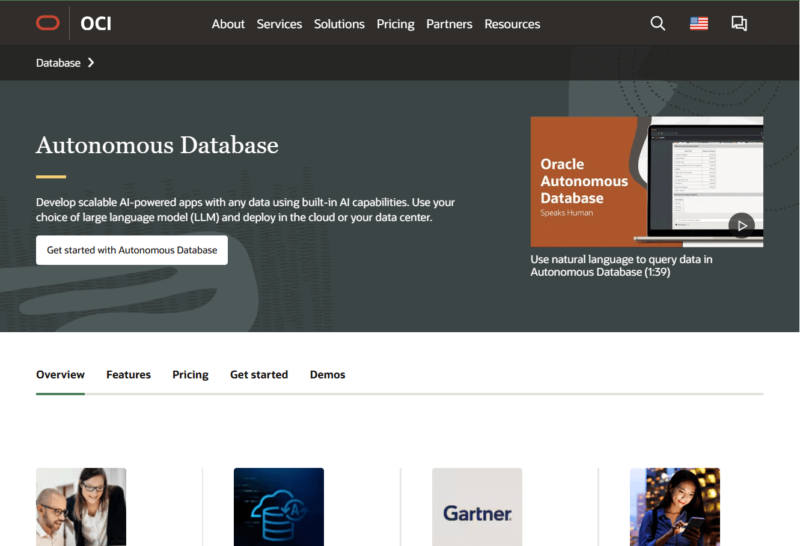What Is Oracle Cloud Infrastructure (OCI)?
Oracle Cloud is a cloud platform owned by Oracle. It leases out computing resources over the internet, private networks or a combination of both. Read on as we discuss Oracle Cloud’s benefits, use cases and services.
Oracle Cloud Infrastructure (OCI) is one of the top cloud computing providers in the world. It offers a vast suite of services across the Infrastructure-as-a-Service (IaaS), Platform-as-a-Service (PaaS) and Software-as-a-Service (SaaS) delivery models, with tools crafted to support businesses of different sizes.
Oracle Autonomous Database, Oracle Enterprise Resource Planning (ERP) and Oracle Human Capital Management (HCM) are among OCI’s most popular offerings. However, OCI offers a wide range of additional services. Read on as we take a deep dive into the services, benefits, use cases, security and various other features of OCI.
What Is Oracle Cloud Infrastructure (OCI)?
OCI is a cloud platform owned by Oracle. Its products and services span across the three main cloud delivery models: IaaS, PaaS and SaaS.
While OCI is a public cloud platform, it also supports multi-cloud, private cloud and hybrid cloud deployments.
Currently among the top 10 cloud providers by market share, OCI is popular for its database solutions including Autonomous Database, Autonomous Data Warehouse and Exadata Database. Beyond those, enterprise users commonly work with services like Oracle Enterprise Resource Planning (ERP) and Oracle Customer Relationship Management (CRM).
Oracle Cloud Web Services
Oracle Cloud web services encompass various categories, including compute, storage, database services, developer services, analytics, AI and machine learning.
- Virtual Machines: The Virtual Machines service is an IaaS solution that lets you create virtual computers on OCI remotely. With Virtual Machines, you can deploy instances for various purposes, including web servers, databases, cloud app development and application backends.
- Autonomous Database: Oracle Autonomous Database is a database service that stands out due to its self-managing abilities driven by its AI integration. It streamlines database management, reducing the manual tasks that database administrators must perform.
- Identity and Access Management: OCI Identity and Access Management (IAM) is a service that allows you to manage user access and privileges across your Oracle Cloud environment.
- Analytics Cloud: Oracle Analytics Cloud offers various capabilities, including data visualization, enterprise data modeling, and data preparation and enrichment. It is a one-stop solution for data analytics and developers.
- Object Storage: Oracle Cloud Object Storage is a storage service for unstructured data of varying sizes. It offers high durability and scalability across storage tiers with different access frequencies and performance.

large language model (LLM) for its AI features.
Oracle Cloud Security
Oracle Cloud’s security consists of various measures you’d expect from a top cloud provider, including IAM, network firewalls, vulnerability scanning, access governance, vault/key management and Bastion. Apart from these in-cloud security tools, it has Oracle Global Physical Security, which safeguards its data centers, assets and employees.

OCI Pricing
Like most cloud computing providers, OCI primarily uses pay-as-you-go pricing, offers massive discounts for long-term commitments, and has a free tier. However, it stands out because — unlike other cloud computing options — OCI uses the same unit rates across its regions. You can use the Oracle Cost Estimator tool to evaluate the costs of OCI services.
Oracle Cloud Free Tier
Oracle Cloud Free Tier comes with a $300 credit valid for 30 days, but it is available only in countries that are in commercial OCI service regions, like the U.S., the U.K. and Australia.
Some Oracle Cloud services are always free within specified limits — as long as you stay within them, you’ll accrue no charges.
Strengths of Oracle Cloud Services
When compared to some close alternatives such as Google Cloud and Microsoft Azure, Oracle Cloud’s strengths include pricing, database performance, security and seamless integration within the Oracle ecosystem.
- Pricing: Oracle Cloud’s pricing is typically uniform across its regions, resulting in less complex pricing. That aside, OCI offers various cost management tools along with its bring-your-own-license model, which helps you save a lot.
- Database performance: Oracle’s databases (including Oracle Cloud databases) are among the most widely used databases because of their scalability, reliability and robust security. Some databases come with innovative features, as you can see in products like Autonomous Database.
- Seamless integration: If you have existing Oracle infrastructure, such as servers and databases, integrating your on-prem infrastructure with Oracle Cloud is seamless.
- Security: Oracle Cloud offers high-grade security features like IAM, auto-encryption, database auditing and vulnerability scanning. Therefore, it is a top option for organizations such as finance and health, as well as users who handle sensitive workloads.
- Compliance: Oracle Cloud has various compliance certifications and adheres to many regulations, particularly those relevant to enterprises. Therefore, it’s no surprise that it is a popular option among enterprises.
Weaknesses of OCI
While OCI offers seamless integration with Oracle infrastructure and excellent database performance, it has a limited ecosystem and is relatively more complex for beginners.
- Limited Ecosystem: OCI has a relatively small developer community and a limited number of third-party integration tools. These underline its narrow ecosystem, which translates to limited support, especially open-source support.
- Steep Learning Curve for Beginners: Due to its limited developer community, there’s a dearth of information available to beginners on public developer forums about how to use Oracle Cloud, and this poses a learning barrier.
- Vendor Lock-In: Like every other hyperscaler, Oracle Cloud offers a vast catalog of services, leaving open the possibility of vendor lock-in.
What Is Oracle Used For?
Oracle Cloud is used for customer behavior analysis, quality control, logistics forecasting, AI-driven application development, medical transcription and other functions.
- Customer behavior analysis: Users can combine data ingestion tools, such as OCI Data Integration, with storages like Oracle Object Storage and analytics tools like Oracle Analytics Cloud. In doing so, Oracle Cloud can create a solution that lets you collect, store and analyze information about customer behavior, allowing you to better predict customer needs.
- Quality control: You can create an image classification system that detects product damages using a combination of AI, machine learning, analytics and storage services such as OCI Vision, Oracle Object Storage and Oracle Analytics Cloud.
- Logistics forecasting: Enterprise services like Oracle E-Business Suite can provide data for your logistics, which you can collect using OCI FastConnect. You can then use OCI Data Flow to process batches of data before analyzing it with a combination of tools like OCI Functions, Oracle Analytics Cloud and Graph Studio to generate predictive information about logistics.
- AI-driven application development: Oracle Application Express (APEX) has a feature called APEX AI Assistant that helps you develop applications based on your prompts.
- Medical transcription: You can use OCI Speech to transcribe voice files containing medical information into text, which is easier to transfer and look over.
Who Uses Oracle Cloud Solutions?
Users of Oracle Cloud solutions include large enterprises, developers, medium and small businesses, data analysts and scientists, and database administrators.
- Large enterprises: Large enterprises use solutions like Oracle Cloud ERP because it affords them a suite of services, including managing risks, compliance, enterprise performance, finances and procurement. Oracle Cloud also offers security tools, compute and databases, which enterprises use for various workloads.
- Medium and small businesses: Medium and small businesses also use Oracle Cloud for their day-to-day operations, including customer experiences, supply chain management and retail monitoring.
- Developers: Developers can work with a wealth of tools and services on Oracle Cloud, from software development kits and command-line interfaces, to code editors, plugins, low-code tools and AI app development assistants.
- Data analysts and scientists: With tools like Oracle Analytics Cloud and Graph Fusion, data analysts and scientists can access a suite of features that cover all phases of their work.
- Database administrators: Oracle Cloud’s databases are among its top offerings. Data administrators who manage and maintain databases can therefore make good use of Oracle Cloud.
Companies That Use Oracle Cloud
Below, we’ll list some of the companies that use Oracle Cloud:
- AT&T
- Nokia
- Vivo
- Mazda
- Caltech
- Subaru
- University of Michigan
- University of Reading
- Red Bull Racing
- Goldman Sachs
Final Thoughts: Why OCI?
OCI is a great choice if you want enhanced database performance, seamless integration with your existing Oracle ecosystem, and innovative AI and machine learning services. It is also a top option that provides scalable and reliable services in a private, public, hybrid or multi-cloud environment.
Have you ever used any Oracle Cloud service? If yes, which one did you use and for what purpose? If you have never used an OCI service, which one are you considering? Let us know your thoughts in the comments below. Thank you for reading.
FAQ: Oracle Cloud Computing
The three types of Oracle Cloud are IaaS, PaaS and SaaS.
Oracle is the company that owns Oracle Cloud, which is a cloud computing platform.
Oracle OCI is designed to help with various needs, particularly those relating to databases, artificial intelligence, machine learning and enterprise solutions.


